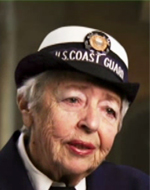
Dorothy Dempesy
Boatswain's Mate First Class Dorothy Dempsey served in the United States Coast Guard Women’s Reserve (SPARS) during World War II. She was responsible for security at Boston Harbor and helped pave the way for future women in the military.
QUESTION: Why did you join the Coast Guard?
DOROTHY: I grew up on the water, on Long Island Sound, right off an island called City Island,
where they made sailboats and still do. The sails are a big item there. I was in the water maybe
three times a day. We lived about two or three blocks away from the water and we belonged to
the Westchester Country Club. I watched some of the big swimmers, the New York State
breaststroke champion and then my father pointed out Gertrude Ederle as having swam the
English Channel, and she was a member of the club. I was just a kid. Well, I was in awe of
these people, you know, and my father would push me and push me and I was the only girl. I
had two brothers and they were great swimmers. They were tall, thin guys and I was not built
like that. But he'd say you got to keep up with them and he'd tell me come on, stroke, stroke. Do
it the right way. But anyway, I love living there and when the war came I wanted to do
something to help and I joined something called the American Women's Voluntary Services. We
didn't have women's services yet, no Army, Coast Guard, whatever. I worked with them for
about a year and then they opened the services to people. I said I want to go into either the Navy
or the Coast Guard. And I went to the Navy, which was great. But something about the Coast
Guard kept drawing me back. Maybe it was because it had more to do with boats and I grew up
that way. So I joined the Coast Guard, came home, and my father threw 10 fits. I was the only
girl in the family and I was the only one in the military. What am I going to tell my neighbors,
he said, that my daughter's wearing a uniform? I said yeah, be proud of it. I did my boot camp
in Florida under the hot sun, oh God, on those drill fields. The girls were dropping like flies, but
they actually had a big need in the Coast Guard because the fellas had to stay in the harbor and,
of course, they had to be out in the boats, especially in Boston because that area is where the
German subs were trying to come in. They couldn't make it in New York, so they went around
the bend and thought they could get in in Boston. Anyway, when I joined, I worked on planning
and where the jobs were needed most so that the men could go out in the boats. We would man
the desks. We would do the shore work and let them go, it worked out really well. We were
even, I think, stronger than the Navy at that time in the very beginning. We did our boot camp,
as I say, in Florida. When I came up to Boston, I saw how busy that harbor was and especially
patrolling at night on the beaches, because this is where the subs were trying to come in. So, our
girls were stationed all the way out almost to the end of Cape Cod and I really enjoyed my work.
It had to do with transfers and where the need was. It wasn't anything specific that you could tell
somebody. I could just say I took care of transfers and where the need was.


